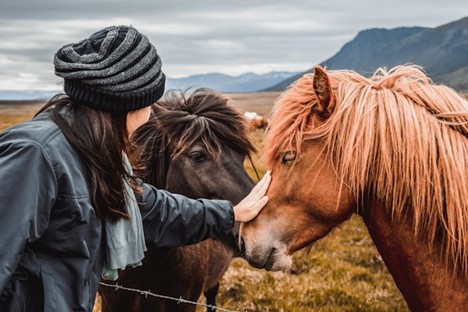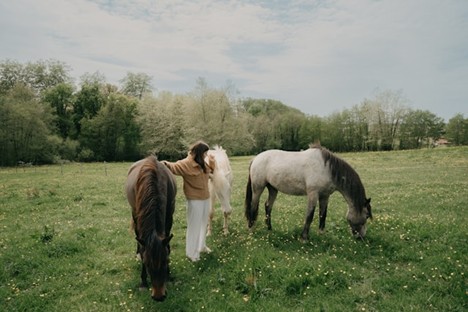
Recovery from emotional trauma, behavioral challenges, or substance use is rarely straightforward. Individuals often struggle with trust, emotional regulation, and developing effective coping strategies for everyday life. While traditional therapy remains a critical component of healing, equine therapy offers a distinctive pathway for growth that complements these approaches. Working with horses provides a powerful, experiential way for participants to develop self-awareness, confidence, and essential life skills. These insights that can have a lasting impact well beyond the traditional therapy setting.
Animals offer a form of therapy that is immediate, nonjudgmental, and highly responsive. Unlike humans, animals respond directly to energy, tone, and behavior, giving individuals real-time feedback about their emotional state. This feedback loop allows participants to recognize patterns in their emotions and behaviors that might otherwise go unnoticed.
Horses are extremely perceptive. As prey animals, they are naturally attuned to the energy and emotional state of those around them. Their reactions to fear, aggression, or calmness can be both revealing and instructive. For someone in recovery, this provides a safe, nonverbal mirror that encourages introspection and growth.
Trust is often one of the most difficult challenges for individuals entering recovery programs. Many have experienced broken relationships, trauma, or inconsistent caregiving, leaving them wary of others. Working with animals can bridge that gap, offering a consistent, reliable presence that is responsive but not judgmental.
Through daily interactions, feeding, grooming, or guiding a horse, participants learn that trust is earned through consistency, patience, and authenticity. When a horse responds positively to calm, measured behavior, it reinforces the idea that stable actions and emotional regulation can create meaningful relationships. Over time, these lessons in trust and emotional awareness transfer to human connections, enhancing social skills and interpersonal resilience.
One of the primary goals of recovery programs is helping participants manage intense emotions. Animals provide a safe, immediate context for practicing these skills. When an individual approaches a horse in a state of agitation or fear, the animal may resist or react defensively. Conversely, a calm, focused approach often results in cooperation and positive interaction.
This dynamic teaches participants that their emotional state directly influences outcomes. Practicing patience, mindfulness, and intentional action with a horse helps participants develop coping strategies that extend beyond the stable or program environment. These skills, such as emotional regulation, self-soothing, and mindful presence, are invaluable in managing stress, cravings, or interpersonal conflict during recovery.
Animals depend entirely on the individuals caring for them. In recovery programs, participants are often tasked with daily care routines, which can include feeding, cleaning, grooming, and monitoring the animal’s health.
These responsibilities cultivate a sense of accountability. Participants learn that their actions have direct consequences for another living being, which fosters a sense of purpose and structure. For someone whose life may have been chaotic or marked by self-destructive behavior, this experience is transformative. It reinforces discipline, reliability, and the understanding that consistent effort leads to tangible, positive outcomes.
Working with a large, powerful animal can initially provoke fear or hesitation. Overcoming this fear through guided interaction builds confidence and a sense of personal competence. Successfully leading, riding, or engaging with the animal demonstrates to participants that they can face challenges, master new skills, and achieve goals they once thought impossible.
This boost in self-efficacy is crucial in recovery. It encourages individuals to take ownership of their healing process, try new coping strategies, and persist through setbacks. The lessons learned in the stable often translate into everyday life, giving participants a tangible sense of empowerment.

Much of animal interaction is nonverbal. Participants must learn to interpret subtle cues, such as body language, tone, or energy, and respond appropriately. This hones observational skills, patience, and empathy.
Developing these nonverbal communication skills helps individuals in recovery better understand and navigate human relationships. They learn that consistency, attentiveness, and respect foster trust and cooperation. In turn, this reduces conflicts, improves interpersonal effectiveness, and strengthens support networks, critical components for maintaining long-term recovery.
For individuals who struggle with verbalizing trauma or emotions, animal-based programs offer a safe outlet. Horses provide unconditional, nonjudgmental presence, allowing participants to express frustration, sadness, or anxiety without fear of criticism.
This kind of emotional release can be profoundly healing. Participants often report feeling seen and validated by the animal’s presence, which in turn lowers resistance to human-centered therapy sessions. The trust and emotional safety cultivated in the animal-based environment create a foundation for deeper therapeutic work.
The benefits of animal-assisted recovery extend well beyond the duration of a program. Participants frequently carry the lessons of patience, trust, empathy, and emotional regulation into daily life. They develop a renewed sense of confidence and resilience that equips them to navigate challenges without reverting to old patterns.
Families and caregivers often notice improved communication, increased self-awareness, and stronger interpersonal skills. These gains are often more durable than those achieved through traditional therapy alone, because the learning is experiential, embodied, and reinforced through repeated practice.
The immediacy of feedback, combined with the nonjudgmental nature of a horses’ responses, creates a learning environment that is both safe and highly impactful. They also teach participants about boundaries, trust, and the consequences of actions in a way that few other experiences can replicate. The bond that forms between horse and human often becomes a catalyst for broader personal transformation.
Recovery is a journey that requires courage, self-reflection, and persistence. While counseling, education, and structured programming are essential, animal-based programs provide a distinct and powerful avenue for lasting change.
Through trust-building, emotional regulation, responsibility, and nonverbal communication, participants gain skills that extend far beyond the program. Horses, in particular, serve as mirrors, teachers, and companions, guiding individuals toward self-awareness, resilience, and confidence.
The lessons learned through these interactions are not fleeting; they leave a lasting imprint, equipping individuals with the tools they need to thrive long after their formal recovery experience ends. Animal-based programs demonstrate that healing is not just about addressing challenges, it is about cultivating strength, empathy, and hope for the future.